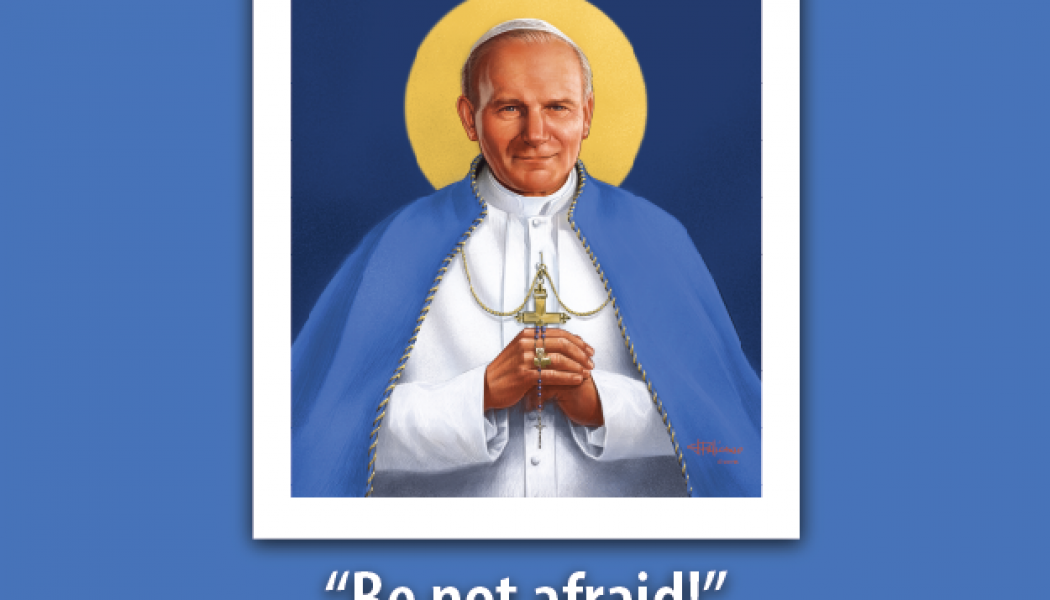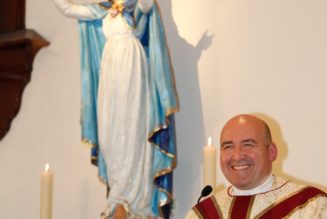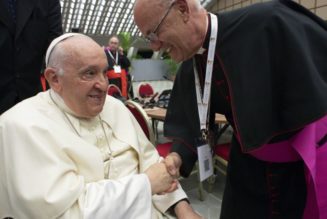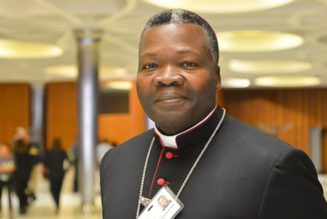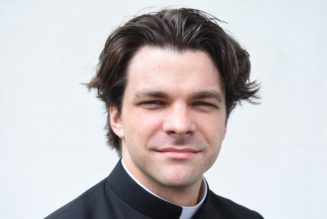By Dr. Jeff Mirus ( bio – articles – email ) | Dec 15, 2020
It is difficult to offer a comprehensive critique of our Godless modern culture simply because it is so difficult to know where to begin. In this instance, I will start at the top, so to speak, with a consideration of the absurdity of our captivity to the modern bureaucratic State. I grant that it is not always easy to say exactly which modern bureaucratic solutions we would be better off without, but there is a peculiar feature of our intensely bureaucratic way of life today which merits serious reflection. By creating and funding comprehensive “programs” to “ensure” the well-being of entire populations, the modern State consistently creates fresh burdens which limit both human freedom and the pursuit of more authentically human solutions. This may sound a bit abstract, so let me offer some big-picture examples, in which the bureaucratic tail so very obviously wags the personal dog:
- Immigration: One of the chief objections to immigration in many Western nations seems to be that new immigrants place too great a load on modern social services—that is, on all the services to which people are entitled by virtue of living under particularly bureaucratic governments.
- Crime: One significant handicap in fighting crime, perhaps most especially in the United States, is the tremendous cost of comfortable, comprehensive prison systems with high service levels, and the corresponding insistence by the State on an allegedly rehabilitative incarceration as the primary form of punishment.
- Public health: We have apparently now reached the stage in which people cannot be allowed to get sick because they will overload the hospital-based health systems which are designed to provide the highest level of care. Hence Covid restrictions in many places have been triggered more by the pressures on public health services than on the true dangers of the illness.
- Education: Western States now provide incredibly expensive, comprehensive education systems. Not only do these systems add tremendously to the costs of immigration (mentioned above), but they have taken on the primary purpose of fostering conformity with the reigning bureaucratic mindset. Yet they stand as huge roadblocks to the reallocation of resources by families in ways which produce far better educational, social, moral and spiritual results.
These are just four quick examples, off the very top of my own relatively pointy head. But again and again ordinary human initiatives are thwarted in modern states because of both the immense regulatory burden of attempting to meet the bureaucratic “requirements” and the monumental tax burdens imposed in the name of such allegedly superior and comprehensive systems. I say all this without even yet touching on the exclusion of God which characterizes all bureaucratic systems, in keeping with the myth that such systems can and must “control reality” to suit themselves.
One is inescapably reminded of the brilliant tenth chapter in Charles Dickens’ Little Dorrit, entitled “The Circumlocution Office”. The mind boggles at the circularity of the logic that drives our modern bureaucracies in their most fundamental operations, along with the political ideas which support them. As indicated in my examples, and in many more examples drawn from political speech everywhere, there is a kind of circular reasoning here which not infrequently infects (if that were possible!) the minds and hearts of the citizenry itself.
Dependent populations
Bureaucracies eventually fall under their own weight, but in the meantime they create dependent populations by an unceasing combination of requirements, benefits, and penalties. On the one hand, ordinary citizens become dependent because they must constantly jump through bureaucratic hoops which are (ostensibly) designed to protect people against incompetence, chicanery and, of course, human initiative. On the other hand, those who reap the direct benefits offered by the bureaucracy (whether as employees, service providers, or recipients of benefits) become State clients who look constantly to government for something more. (It will be interesting, in this respect, to see if Federal and State Covid grants become a staple of a more comprehensive bureaucratic dependency system. Nothing increases dependency on the bureaucratic State more quickly than policies which directly undermine flourishing sectors of the economy.)
In most Western countries, or so I suppose, political shifts typically increase the size of the bureaucracy: The sweep of the new broom moves the dirt around while adding to it, but seldom removes much of it at all. But in most places, one or more parties seem to thrive on a marriage between the very wealthy, who are disposed to wield their influence through the political manipulation of the social order, and the dependent populations they create through the promise of governmental “care” and bureaucratic largesse. Sadly, as has been recognized now for centuries, once citizens learn that they can use the vote to acquire personal benefits, rather than to seek the common good, then democracies become as prone to bureaucratic tyranny as any other form of government.
However we chart the wide variety of causes, and however we tally up the score of what developments and restrictions have been helpful or hurtful to the common good, we now find ourselves in a situation in which we are largely incapable of thinking outside the bureaucratic (Statist) box. Most of us are incapable of conceiving any form of communal organization which does not depend on the existence of widespread and even comprehensive government controls. For a great many people today—perhaps most—everything is fundamentally political (by which we really mean a matter of bureaucratic regulation), and we scarcely know how to think in terms of personal initiative, local organization, intermediary institutions, or sources of moral authority which operate independently of the State.
Compounding the problem
Sadly, this bureaucratic mindset has also infected the Catholic Church. We need look no further than the contemporary Covid restrictions to realize how difficult it is even for the leaders of the Catholic Church to imagine a human organizational system in which the all-encompassing modern bureaucratic State is not considered, almost by the very nature of things, to be the dominant authority on every human question. Or, to take one other example, how often do we see the various episcopal conferences around the world advocating the same policies in very nearly the same words as those proposed by this or that party which thrives on the power of the bureaucratic state!
To say only the very least, independent Christian thought is at a premium. Modern Catholic universities, for all their illusory claims to freedom, are most often today held hostage to the same bureaucratic and regulatory mindset—perhaps the mindset of seeking standing in the dominant culture at the expense of truth, or even the mindset which pursues public grants at the expense of grace. Speaking of universities inescapably leads to a consideration of theory, in the sense of ideology. Ideology is always a substitute for that combination of reflection and prayer which makes the human mind fruitful. It is very telling that the university today is the mainspring of ideology, and it is notoriously true that ideology always looks to incorporate itself in politics, spawning bureaucracies. It is axiomatic that depersonalized cultures are necessarily ideological; and that ideological cultures are necessarily, in the deepest sense, anti-personal.
It is precisely personal involvement that creates true community, so it is telling that a primary feature of the bureaucratic mindset is the near-total lack of personal involvement. Everything is reduced to function. Of course, there are other powerful factors that join bureaucracy in diminishing that precious personal engagement which makes such a vast difference in human affairs. One thinks, for example, of the nationwide and even worldwide character of major businesses today, such that the constant mobility of the employees effectively destabilizes both families and communities. Or think about this: Not only the rise of mass media entertainment but even the rise of air conditioning have further transformed our culture into a series of isolated chambers in which people no longer have occasion to form community.
In many ways, I am the worst one to write about this problem, being by nature something of a loner and somewhat reclusive. I rarely socialize. But I can see the problem, which is exacerbated by the progressive disintegration of communal ties, the most important of which is marriage itself. Still, it is precisely through genuine community that we learn the fundamental values of human life, the values that make such a great difference to our ability to get through hard times, to heal after trauma, to learn by example, and to respond to personal love. Catholics ought to be in the forefront of offering this love, of course, but it is very hard to acquaint our society with the transformative character of Christian love and care when our culture is designed to minimize authentic human community, and to deny natural human interdependence.
On the verge of collapse…
As mentioned earlier, particular bureaucratic social orders are always doomed to collapse under their own weight, a reality which sadly does not prevent their reemergence in new forms. The collapse is made inevitable in the long run by the very disproportion through which they gain initial credibility—the immense disproportion between the sheer size of bureaucratic government and the individual littleness of those controlled by that government. It is part of the rhetorical sleight-of-hand of modern political systems to emphasize the individual vote as if it were the consummate mechanism of human liberation. In reality, it is precisely when people believe “the vote” is their salvation that the bureaucratic State has won its victory, for the individual “voter” has exactly zero power in the face of the overarching mechanisms of the State. Sadly, it is in celebrating the very State which somehow “assures” their votes that citizens typically forsake the ability to establish and participate in institutional counterweights to a wildly disproportionate political power.
This problem is aggravated by the all but vanishing sense of virtue, character and initiative in populations trained and formed by modern bureaucratic States—which unfailingly foster a universal material and moral laziness. Call it a rule of politics: The more prominent the State, the less important all other institutions become, based as they are on vanishing community. In contrast, it is primarily through true community that authentic love bears personal witness to the truth. It is primarily in true community that reverence for God arises from grace-filled personal action, which is no longer swept aside as irrelevant or worse.
In our time, we have been formed so much “politically” that we can no longer even recognize the most fundamental building blocks of a flourishing human society in men who are men, women who are women, and families which grow and gather strength in common with each other—all in that cohesive yet gloriously free profusion occasioned by the manifold service of the Living God. Let me make the same point by subtraction: Only a fool trades such once-thriving realities as the family, the extended family, the surrounding network of real neighbors with common interests, the occupational guild, a host of active voluntary associations rooted in the local community, the local township as a true political center, the parish family, and the Church, all in return for a commuter culture, an electronic fantasy world, and individual dependency on the all-encompassing regulatory State.
Sadly, in recent centuries, most of us have been fools. And now we hardly know where to begin. The crisis is particularly acute just now: In the world of Covid, in a perverse and even diabolical inversion of the Gospel, the State which already has is given more, and the Church which has not loses even what little she has.
Possibilities for renewal?
If the modern State, along with ancient Rome, is what the Book of Revelation refers to as “Babylon the Great”, then for a complete release we must await the angelic cry which precedes the end of all things: “Fallen, fallen is Babylon the great! It has become a dwelling place of demons, a haunt of every foul spirit” (Rev. 18:2). But as I mentioned above, it is a particularly bitter reality, and a source of even greater scandal, that the Catholic Church today mirrors in so many ways the bureaucratic fallacies of the modern State. The Church too, therefore, must have her own collapse and renewal, born of the realization that she is not a bureaucracy driven by Vatican offices, carefully-managed synods, and national episcopal conferences—but rather a sacramentalized unity of priests, prophets and kings who, in personal conformity to Jesus Christ and each according to his Divine station and calling, must witness to the holy and apostolic truth. Whatever we might say about the State today, we can see that the Church is going through this collapse even now (as a prelude, I hope, to a genuine renewal).
In an important sense, a complete renewal can occur only in the New Heaven and the New Earth. In terms of renewal in time, however, there have been several wholesale propositions offered recently (one example is Rod Dreher’s famous book, The Benedict Option). For its part, CatholicCulture.org focuses on the path to authentic renewal frequently, and I certainly have some particular ideas of my own. Clearly, however, we must first perceive something of what is missing, and must understand many of the larger trends that have contributed to the elimination of what is missing. The one certainty is that we will have to choose to break some thoroughly ingrained cultural habits in order to begin to recover and make present to others those patterns of life which, simply by their absence, dramatically impede the progress of the Gospel.
We can at least begin now to turn away from constant mobility and insularity, recognizing once again the need to form families and groups of families and in turn be formed by them, gradually restoring the basis of authentic human community, which is the natural locus and engine of service through love. Even if we cannot foster such community as much as we would like, we can begin to curtail our own headlong flight into isolated human fantasies, and begin to wean ourselves from the deceptive promises of human bureaucracies—from the facile assumption that everything we might be called to do is already under control, and that happiness for everyone is achievable through individual adhesion to regulatory procedures. This weaning, in turn, will make it even easier for us to recognize exactly what we have been missing in mankind’s dreary attempts at bureaucratic substitutions for God.
Perhaps it is Francis Thompson who put all this most succinctly in his brilliant late nineteenth-century poem, The Hound of Heaven. In this masterpiece, God Himself catches up to each one of us as we flee him—perhaps in our very own Circumlocution Office—“down the labyrinthine ways”:
Ah, fondest, blindest, weakest.
I am He Whom thou seekest.
Thou dravest love from thee, who dravest Me.
Sound Off! CatholicCulture.org supporters weigh in.
All comments are moderated. To lighten our editing burden, only current donors are allowed to Sound Off. If you are a current donor, log in to see the comment form; otherwise please support our work, and Sound Off!

Join Our Telegram Group : Salvation & Prosperity
